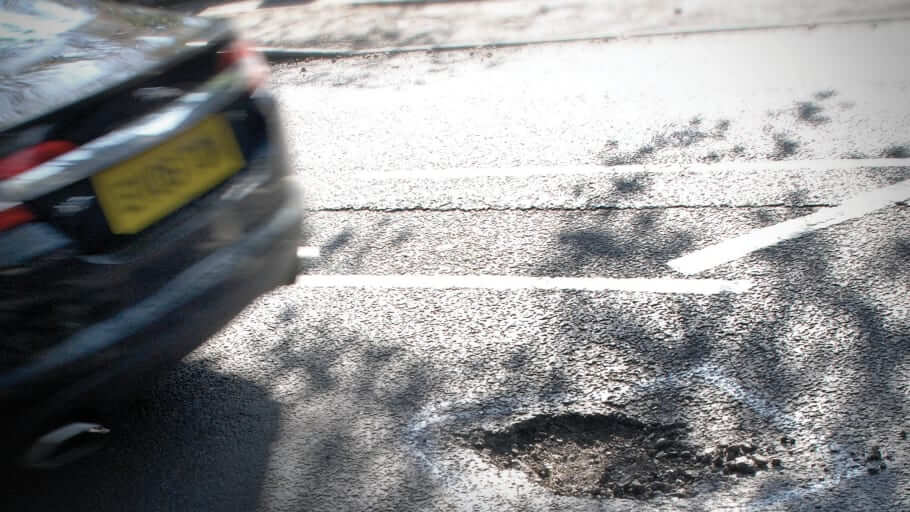MPs have accused the Department for Transport (DfT) of not taking its responsibilities and use of public money on local roads sufficiently seriously in a new, scathing report.
As part of the Government’s funding to maintain local roads, more than £1 billion a year is given to local authorities.
However, an inquiry by MPs on the Public Accounts Committee (PAC) found that the DfT does not know how the cash is spent as it is not ring-fenced, nor what it wants to achieve with it.
Government data presented to the inquiry showed the condition of local roads as stable - despite industry estimates showing that the condition of local roads is worsening, as public satisfaction falls and pothole-related incidents rise.
With information only collected on unclassified roads on a voluntary basis from local authorities, the DfT admitted to MPs that its data is not good enough.
The DfT does not take into account traffic volumes, underlying road condition or local environmental conditions such as whether a road is prone to flooding.
The inquiry also heard that local authorities may be doing just enough maintenance work to keep their roads from being rated ‘red’.
Committee chair, Sir Geoffrey Clifton-Brown MP, said: “The declining state of England’s local roads is a national embarrassment.
“As well as harming the prospects for our economy and communities’ own social wellbeing, highways riddled with potholes pose an increasing safety threat to road users.
“Alarmingly, however, not only is the state of our local roads on the downslope, our inquiry shows Government are having to find out about these issues from industry bodies and road users themselves due to their own patchy data.”
The committee’s report - Condition and maintenance of Local Roads in England - also criticises the short-term approach of central Government funding for local authorities to repair local roads, which the DfT admitted to the inquiry is not best value for money.
Providing only annual funding is likely to have pushed councils to focus more on reactive repair work, rather than preventing problems occurring in the first place.
The report calls on Government to simplify its funding to local authorities (currently given through 12 different funding pots), and to provide longer-term certainty on the amount and duration of funding.
More support and guidance must be provided to local authorities to deal with current and future challenges in maintaining local roads, in particular on how best to support safety and accessibility for all road users, it says.
Looking ahead, the Government should also be considering how best to manage and prepare for technology advances such as autonomous vehicles and the effect of maintenance on roads and bridges of heavier electric heavy goods vehicles.
“This committee has long raised concerns around a failure across Government departments to effectively fund and plan for the future, a theme that is certainly on show here, along with an overly tangled web of accountability,” added Clifton-Brown.
“This committee shares our constituents’ frustration at these issues, and hope our recommendations go some way to help the Government take better responsibility for them.”
The poor state of roads is the number one transport concern for 96% of drivers, according to the AA. “This report reinforces many things the AA has been calling for,” said Edmund King, AA president.
“We have highlighted the need for longer-term, ring-fenced investment using innovation and technology to permanently repair local roads rather than the short-term patchwork approach.
“The committee is right to highlight the inconsistency of councils inspecting and repairing the highway. Whilst funding shouldn’t just be based on length of roads, equally we need to ensure that extra funding isn’t just given to failing highway authorities who continue to get it wrong.”
The Government has announced that local authorities will receive a share £1.6bn roads funding, an increase of nearly 50% on local road maintenance funding from last year.
A DfT spokesperson told Fleet News: “For far too long our roads have been left to crumble, and this report has laid bare the result of the decades of decline we have inherited in our road infrastructure.
“That’s why we’re investing a record £1.6bn for the coming year to help local authorities fix up to seven million more potholes.
“Road users are rightly frustrated by patch work repairs, so we are also committed to multi-year funding settlements to enable councils to better maintain their road networks and avoid potholes forming in the first place.”
The AA attended 643,318 pothole related incidents in 2024, and estimates pothole damage cost drivers £579m last year.
Meanwhile, the RAC says that breakdowns jumped by almost a fifth (17%) in the final three months of 2024, compared to the previous quarter.
Patrols assisted 4,709 drivers from October to December for damaged shock absorbers, broken suspension springs or distorted wheels, with callouts most likely to be caused by wear and tear from defective road surfaces.
King continued: “The report says the Department for Transport should take overall responsibility for policy and use of taxpayer funds sufficiently seriously but seems to have over-looked the important role of private contractors who sit in a position of almost total control over nearly 60% of the local roads.
“It is a concern that data in some areas is so poor that the condition of local roads is not fully understood. However, the new data standards will not be mandatory until April 2026. All road users deserve a much better service from our local road network.”





















Login to comment
Comments
No comments have been made yet.